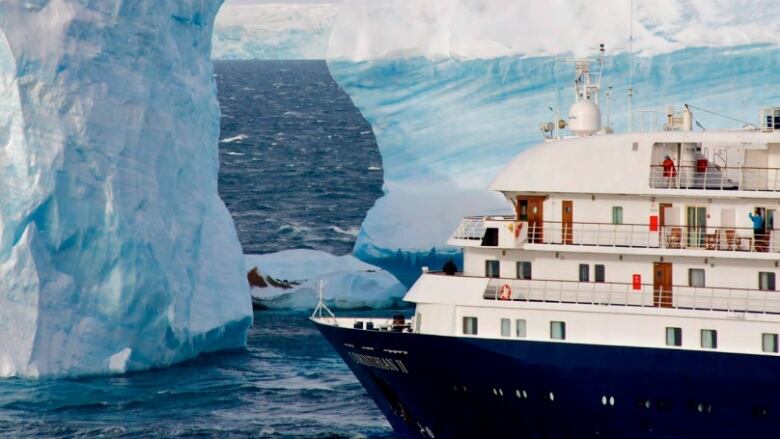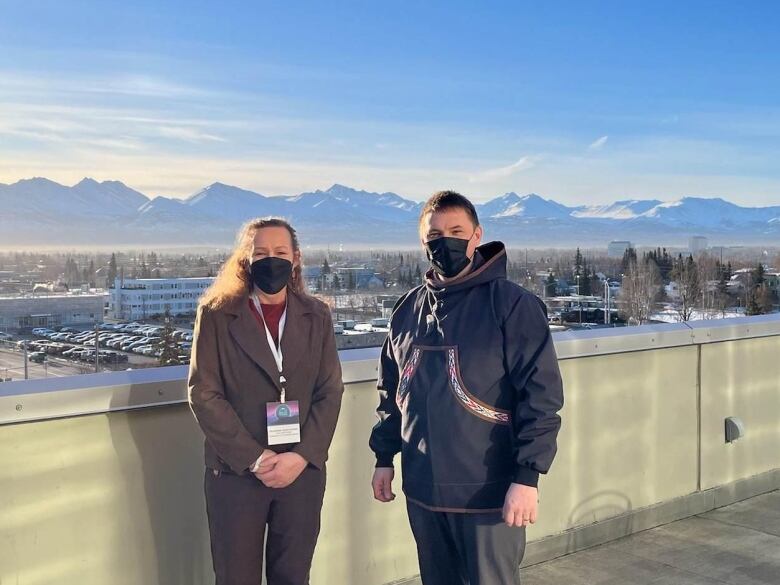Inuvialuit excited, concerned and prepared as cruise ships plan return to Arctic
The Inuvialuit Regional Corporation released a cruise ship management plan for the next three years

After a nearly two-year standstill,cruise ships will be returning to the Canadian Arctic, bringing both opportunity and concern to the communities there.
Several cruise ships have applied to pass through the Northwest Passage into the N.W.T. in 2022, according to the environmental impact screening committee's website.
The Inuvialuit Regional Corporation (IRC) released a three-year cruise ship management plan earlier this year which details how there will be an inevitable increase in traffic as the climate continues to warm and the ice on the Northwest Passage melts.
The plan acknowledges the reality of climate change and the danger it brings, but also the opportunities.
"Visiting the Inuvialuit Settlement Region by cruise ship showcases our remarkable coastal communities in a unique and memorable way," IRC Chair Duane Smith writes in the plan.

The plan outlines policies that ensure vulnerable Arctic Ocean ecosystems aren't damaged, traditional lifestyles aren't affected, beneficiaries will benefit financially and the community is protected from illnesses like COVID-19.
Pandemic fears
Ulukhaktokis among the most popular stops in the N.W.T. for cruise ships, and visitors often buy the local art.
Donna Akhiatak, an artist in Ulukhaktokand manager of the hamlet's art centre, remembers just a few years ago when tourists would arrive.
"The art centre is jam-packed full you can barely move around in the art centre, and non-stop purchasing ... until they leave," she said.
Akhiatak is excited to see tourists again, as the fall the usual time of year for cruise ships has been quiet these past few years.
But she's also worried about the risk visitors could bring.
"At the same time, we have to be cautious because we're still in a pandemic," Akhiatak said.
The art centre is jam-packed full, you can barely move around in the art centre, and non-stop purchasing ...until they leave- Donna Akhiatak, Ulukhaktok artist
This was a concern shared by Paulatuk Mayor Ray Ruben Sr.
"I'd be probably put in the hot seat if I had to make the decision of a cruise ship coming or not. If I said yes, I think I'd be in hot water from a lot of people," he said.
Ruben Sr. said he thinks it's too soon and that the risk of COVID-19 entering the community would outweighany benefits.
As a result of these concernsand others, the IRC is requiring tourists to receive permission from communities before entering. The permission will need to be proven before anyone steps ashore.
There will also be health and safety restrictions in place, including assurances no one with COVID-19 will enter any communities. That means no one aboard can have had any COVID-19 symptoms for 14 days prior to arriving.
Economic impact
The plan also outlines how anyone who disrupts someone who is fishing, hunting or trapping would be financially liable for any losses resulting from the cruise.
It also outlines opportunities for Inuvialuit.
"Operators will be expected to support the local economy," the plan reads.
This includes hiringlocal guides for community tours, engaginglocal performers for cultural tourism experiences, and purchasingarts and handicrafts from local artists.
"Local artisans express their culture and traditions through their work, and their handmade products inspired by the land provide sustainable and respectful souvenirs," the plan reads.

Environment impact
A major fear with the increase in boat traffic is environmental damage that could be devastating to ocean lifeand those who live off it.
The plan outlines federal legislation that is in place to prevent any damage to the delicate ecosystem in the Arctic Ocean.
This includesa law that preventswastewater from being discharged from ships.
Ships often need to discharge water that can be contaminated with toxins either from the engine, or that can accumulate at the bottom. However, dumping of waste in Canadian Arctic waters is prohibited under the Arctic Shipping Safety and Pollution Prevention Regulations.
There are also zero-waste rules around garbage being left in the ocean or on land, meaning proper disposal will be enforced.
The plan also discusses establishing an Inuvialuit monitoring program, where photos would be taken before and after a cruise ship visits a site.

Cruises for the North in the North
N.W.T. Premier Caroline Cochrane said in a press conference last week that the impact of cruise ships was discussed at the Arctic Encounter Symposium in Anchorage, Alaska.
They bring "huge opportunities in tourism," she said.
Cochrane said she had a conversation with leaders from Iceland and Greenland about establishing local cruise lines between the nations that could be mutually beneficial.
"Instead of letting people come from the south and bring cruises up and not having a lot of benefit to us ... Can we look at that so cruises come from our countries and we gear them towards the communities that we want so that we can bring economic benefit to our people?" she said.












_(720p).jpg)


 OFFICIAL HD MUSIC VIDEO.jpg)
.jpg)



























































































